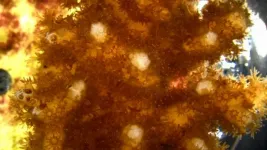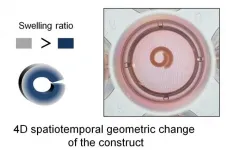(Press-News.org) In a major advance in the treatment of multiple myeloma, a CAR T-cell therapy has generated deep, sustained remissions in patients who had relapsed from several previous therapies, an international clinical trial has found.
In a study posted online today by the New England Journal of Medicine, trial leaders report that almost 75% of the participants responded to the therapy, known as idecabtagene vicleucel (ide-cel), and one-third of them had a complete response, or disappearance of all signs of their cancer. These rates, and the duration of the responses, are significantly better than those produced by currently available therapies for patients with multiple relapses, according to investigators.
Based on these results, an application has been submitted to the Food and Drug Administration for approval of ide-cel as a standard therapy for patients with relapsed or treatment-resistant myeloma. A decision on the application is expected by the end of March 2021.
"Despite numerous advances in the treatment of multiple myeloma, relapses are common. Patients whose disease continues to worsen after receiving standard therapy have relatively few treatment options that provide high response rates," said Nikhil Munshi, MD, of Dana-Farber Cancer Institute, who led the trial. "The results of this trial represent a true turning point in the treatment of this disease. In my 30 years of treating myeloma, I have not seen any other therapy as effective in this group of patients."
Multiple myeloma is a cancer of plasma cells, which are white blood cells responsible for making antibodies against invasive germs. The disease is diagnosed in about 35,000 people in the United States each year, making it the second-most common blood cancer in adults. Among African Americans, it is the most common blood cancer.
Standard treatment for myeloma includes three main classes of therapy: immunomodulatory drugs, proteasome inhibitors (which block the action of protein-degrading structures in cells), and anti-CD38 antibodies. Patients who exhaust these approaches are in urgent need of better treatments.
Like all CAR T-cell therapies, ide-cel is made by collecting patient's immune system T cells and genetically modifying them to express a receptor for a protein on cancer cells. Infused back into the patient, the CAR T cells lock onto tumor cells and destroy them.
The target of ide-cel is a protein on myeloma cells called B-cell maturation antigen, or BCMA. BCMA has several advantages as a therapeutic target in myeloma, Munshi explained: It is expressed exclusively on plasma cells and in particularly large quantities on plasma-turned-myeloma cells; BCMA conducts signals important for myeloma cells' growth and survival; and it is expressed in virtually all patients with the disease.
In the trial, a phase 2 study dubbed KarMMa, 128 patients with active myeloma after receiving at least three previous therapies were treated with a single dose of ide-cel (different doses were tested in different patients). At a median follow-up of 13.3 months, 73% of the patients had a response - a measurable reduction in their cancer - and 33% had a complete response or better. Within this latter group, 79% had no detectable myeloma. The median progression-free survival - the length of time after treatment that the disease didn't worsen - was 8-9 months. Some of the patients have not relapsed more than two years after treatment.
These outcomes outshine those achieved by standard treatments for multiply-relapsed myeloma. Drugs such as selinexor, panobinostat, and isatuximab have a response rate of 25-30% and a progression-free survival of 3-4 months.
The most common side effects of treatment were low blood-cell counts and cytokine release syndrome, a frequent follow-on of CAR T-cell therapy in which the immune system generates an intensive inflammatory response. Clinicians have developed effective treatments for this condition.
The success of ide-cel in patients who had undergone several previous treatments has prompted investigators to launch trials of the therapy in patients in earlier stages of the disease.
INFORMATION:
The co-authors of the study are Nina Shah, MD, of the University of California, San Francisco; Deepu Madduri, MD, of Icahn School of Medicine at Mount Sinai, New York; Jesu?s Berdeja, MD, of Sarah Cannon Research Institute and Tennessee Oncology, Nashville; Sagar Lonial, MD, of Emory School of Medicine, Atlanta; Noopur Raje, MD, of Massachusetts General Hospital; Yi Lin, MD, PhD, of Mayo Clinic, Rochester, Minn.; David Siegel, MD, PhD, of Hackensack University Medical Center, Hackensack, N.J.; Albert Oriol, MD, of Institut Josep Carreras and Institut Catala d'Oncologia, Hospital Germans Trias i Pujol, Badalona, Spain; Philippe Moreau, MD, of Centre Hospitalier Universitaire de Nantes, Nantes, France; Ibrahim Yakoub-Agha, MD, PhD, of Centre Hospitalier Universitaire de Lille, University of Lille, INSERM Unite? 1286, Institute for Translational Research in Inflammation, Lille, France; Michel Delforge, MD, of University Hospital Leuven, Leuven, Belgium; Michele Cavo, MD, of "Sera?gnoli" Institute of Hematology, Bologna University School of Medicine, Bologna, Italy; Hermann Einsele, MD, of University Hospital of Wu?rzburg, Wu?rzburg, Germany; Hartmut Goldschmidt, MD, of University Hospital Heidelberg, Germany; Katja Weisel, MD, of the University Medical Center Hamburg-Eppendorf, Hamburg, Germany; Alessandro Rambaldi, MD, of University of Milan, and Azienda Socio Sanitaria Territoriale Papa Giovanni XXIII, Bergamo, Italy; Donna Reece, MD, of Princess Margaret Cancer Centre, Toronto, Canada; Fabio Petrocca, MD, and Monica Massaro, MPH, of Bluebird Bio, Cambridge, Mass.; Jamie N. Connarn, PhD, Shari Kaiser, PhD, Payal Patel, PhD, Liping Huang, PhD, Timothy B. Campbell, MD, PhD, and Kristen Hege, MD, of Bristol Myers Squibb, Princeton, N.J.; and Jesu?s San-Miguel, MD, PhD, of Clinica Universidad de Navarra, Centro de Investigacio?n Me?dica Aplicada, Instituto de Investigacio?n Sanitaria de Navarra, Centro de Investigacio?n Biome?dica en Red de Ca?ncer, Navarra, Spain.
The study was supported by Bluebird Bio and Bristol Myers Squibb.
The genetic tool CRISPR has been likened to molecular scissors for its ability to snip out and replace genetic code within DNA.
But CRISPR has a capability that could make it useful beyond genetic repairs. "CRISPR can precisely locate specific genes," says Lacramioara Bintu, an assistant professor of bioengineering at Stanford. "What we did was attach CRISPR to nanobodies to help it perform specific actions when it reached the right spot on DNA."
Her lab recently used this combo technique to transform CRISPR from a gene-editing scissors into a nanoscale control agent that can toggle specific genes on and off, like a light switch, to start or stop the flow of some health-related protein inside a cell.
"There are a lot of things you can't fix ...
Baby mice might be small, but they're tough, too.
For their first seven days of life, they have the special ability to regenerate damaged heart tissue.
Humans, on the other hand, aren't so lucky: any heart injuries we suffer could lead to permanent damage. But what if we could learn to repair our hearts, just like baby mice?
A team of researchers led by UNSW Sydney have developed a microchip that can help scientists study the regenerative potential of mice heart cells. This microchip - which combines microengineering with biomedicine - could help pave the way for new regenerative heart medicine research.
The study is featured on the cover ...
BROOKLYN, New York, Wednesday, February 24, 2021 - Travel bans have been key to efforts by many countries to control the spread of COVID-19. But new research aimed at providing a decision support system to Italian policy makers, recently published in the Journal of the Royal Society Interface, suggests that reducing individual activity (i.e., social distancing, closure of non-essential business, etc.) is far superior in controlling the dissemination of Sars-CoV-2, the virus that causes COVID-19.
The research, which has implications for the United States and other countries, found that limiting personal mobility through travel restrictions and similar tactics is effective only in the first phases of the epidemic, and reduces in proportion to the ...
MIAMI--Researchers have perfected the recipe for keeping sea anemone and coral cells alive in a petri dish for up to 12 days. The new study, led by scientists at the University of Miami (UM) Rosenstiel School of Marine and Atmospheric Science, has important applications to study everything from evolutionary biology to human health.
Cnidarians are emerging model organisms for cell and molecular biology research. Yet, successfully keeping their cells in a laboratory setting has proved challenging due to contamination from the many microorganisms that live within these marine organisms or because the whole tissue survive in a culture environment.
UM cell ...
New hydrogel-based materials that can change shape in response to psychological stimuli, such as water, could be the next generation of materials used to bioengineer tissues and organs, according to a team of researchers at the University of Illinois Chicago.
In a new paper published in the journal Advanced Functional Materials, the research team -- led by Eben Alsberg, the Richard and Loan Hill Professor of Biomedical Engineering -- that developed the substances show that the unique materials can curl into tubes in response to water, making the materials good candidates for bioengineering blood vessels or other tubular structures.
In nature, embryonic development and tissue healing often involve ...
PROVIDENCE, R.I. [Brown University] -- Volcanic rock samples collected during NASA's Apollo missions bear the isotopic signature of key events in the early evolution of the Moon, a new analysis found. Those events include the formation of the Moon's iron core, as well as the crystallization of the lunar magma ocean -- the sea of molten rock thought to have covered the Moon for around 100 million years after the it formed.
The analysis, published in the journal Science Advances, used a technique called secondary ion mass spectrometry (SIMS) to study volcanic glasses returned ...
While COVID-19-related lockdowns may have decreased the spread of a deadly virus, they appear to have created an ideal environment for increased domestic violence.c
Data collected in surveys of nearly 400 adults for 10 weeks beginning in April 2020 suggest that more services and communication are needed so that even front-line health and food bank workers, for example -- rather than only social workers, doctors and therapists -- can spot the signs and ask clients questions about potential intimate partner violence. They could then help lead victims to resources, said Clare Cannon, assistant professor of social and environmental justice in the Department of Human Ecology and the lead author of the study.
The paper, "COVID-19, intimate partner violence, and communication ...
BOSTON - Swelling of lymph nodes in the armpit area is a normal response to COVID-19 vaccinations, but when they are seen on mammograms, they can be mistaken for nodes that are swollen because of cancer. In some cases, the nodes are biopsied to confirm they are not cancer. To avoid confusion by patients and their providers, and to avoid delays in either vaccinations or recommended mammograms through the pandemic, radiologists at Massachusetts General Hospital (MGH) have published an approach to manage what is expected to be a fairly common occurrence as vaccination programs ramp up. The approach is described in the American Journal of Roentgenology.
"We had started ...
A new study from North Carolina State University reveals that the soundscapes of coral reef ecosystems can recover quickly from severe weather events such as hurricanes. The work also demonstrates that non-invasive monitoring is an important tool in shedding further light on these key ecosystems.
Soundscape ecology is a relatively new way for researchers to keep tabs on a variety of habitats without direct interference. In underwater habitats like coral reefs, soundscapes allow continual monitoring of an ecosystem that is difficult to access. By deploying underwater microphones, or hydrophones, researchers can get an acoustic picture of the types of animals in the ecosystem, as well as their behavior patterns.
Kayelyn Simmons, a Ph.D. student at NC State, used soundscapes and ...
NASA's Parker Solar Probe captured stunning views of Venus during its close flyby of the planet in July 2020.
Though Parker Solar Probe's focus is the Sun, Venus plays a critical role in the mission: The spacecraft whips by Venus a total of seven times over the course of its seven-year mission, using the planet's gravity to bend the spacecraft's orbit. These Venus gravity assists allow Parker Solar Probe to fly closer and closer to the Sun on its mission to study the dynamics of the solar wind close to its source.
But -- along with the orbital dynamics -- these passes can also yield some unique and even unexpected views of the inner solar system. During the mission's third ...



